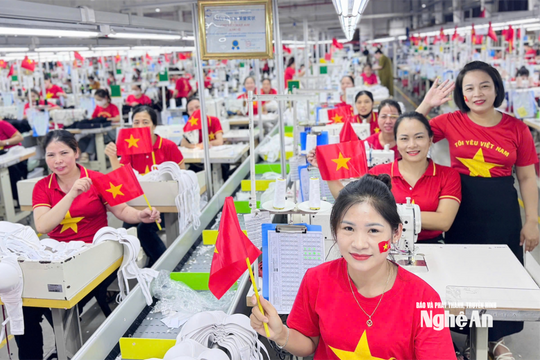Vietnam's labor productivity is among the lowest in Asia.
The Asian Productivity Organization assesses Vietnam as one of the countries with the lowest labor productivity in the Asia-Pacific region.
Accordingly, Vietnam's labor productivity is only 1/15 of Singapore, 1/5 of Malaysia and 2/5 of Thailand. These are also countries with higher competitiveness indexes than Vietnam (Singapore ranked 2nd, Malaysia ranked 20th, Thailand ranked 31st and Vietnam ranked 65th out of 144 economies.
In all industries, Vietnam's labor productivity is only slightly higher than that of Laos, Cambodia and Myanmar, and is basically lower than all ASEAN countries. If calculated at fixed prices, according to the 2015 USD converted to purchasing power parity, Vietnam's labor productivity in 2013 was only 5,500 USD, higher than Laos at 5,400 USD, Cambodia at 4,000 USD and Myanmar at 3,000 USD. Meanwhile: Singapore is 98,000 USD, Brunei is 101,000 USD, Philippines is 10,100 USD and Thailand is 14,800 USD.
 |
| Low paid workers lead to low productivity and vice versa. |
Low labor productivity due to low wages?
According to experts, one of the reasons for Vietnam's low labor productivity is wages, income and benefits for workers. According to the assessment, wages and labor productivity are the relationship between consumption and production in an economy, and also the relationship between work and food, contribution and enjoyment of workers in a business group. Between wages, income and labor productivity there is a connecting point like a binding thread, which is the labor process.
The issue of increasing labor productivity becomes a motivation for workers when they achieve their goals, in which the top goal is income. This is the most important goal that makes workers work, because income helps workers cover their own lives and their families, ensuring survival and development.
Mr. Cao Sy Kiem - former Governor of the State Bank of Vietnam said: "For workers to be motivated and participate in the process of increasing labor productivity, the important thing is salary. They have enough strength to regenerate labor, have motivation, have morale, then they will work, otherwise they will not work or oppose.
In the recent past, we have had many correct policies, but due to slow implementation and failure to meet the reality, they sometimes hinder, are counterproductive, and cause workers to lose confidence, leading to a decrease in the motivation to increase labor productivity. Therefore, we need to increase wages appropriately for workers, of course, we still depend on the health of businesses and the economy, to handle this relationship harmoniously and closely.
According to Mr. Cao Sy Kiem: Increasing labor productivity in small and medium enterprises is the most difficult, they lack capital and poor labor quality, so most of the labor is trained by word of mouth, hand-on training; while there is not much high-tech, modern labor.
Breaking the vicious cycle: compensation and productivity
According to historian Duong Trung Quoc, all people have the same capacity, the important thing is how to develop that capacity through treatment and training. The key is how the employer perceives that subject.
“We talk a lot about Vietnam’s advantages, which is having a large, young, and potential workforce. While employers are always pragmatic and unwilling to invest, low productivity is inevitable. What leads to low wages? Obviously, low wages are due to low contributions from workers and vice versa. Low productivity leads to the consequence of a corresponding compensation regime, like the chicken and the egg story,” said Mr. Duong Trung Quoc.
Mr. Duong Trung Quoc affirmed that Cambodia and Myanmar have more or less similarities with Vietnam in terms of starting point. However, if we look at the mechanism, these countries will leave us far behind in the future, if we do not change the pragmatism and lack of vision of current human resource users.
However, in reality, there are many small and medium enterprises in Vietnam that use very good human resources, bringing about very high productivity. However, it has not become a common point, has not become a policy of the State, and has not built a system of social values.
“So, with the same people, this country, many businesses and organizations use very good human resources, with very high qualifications, on par with the world. However, in our country, it is still common for businesses to take advantage of immediate advantages, without thinking about long-term investment” – Mr. Duong Trung Quoc shared more./.
According to VOV
| RELATED NEWS |
|---|








